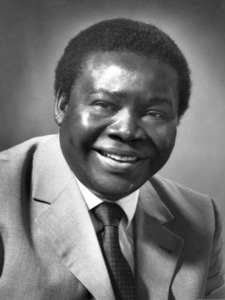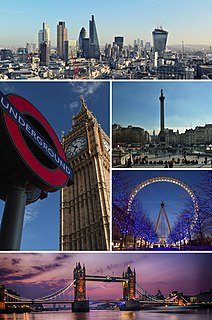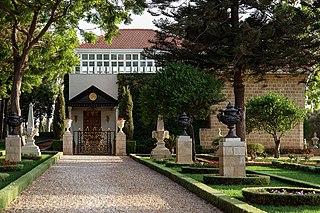Covenant-breaker is a term used by Bahá'ís to refer to a person who has been excommunicated from the Bahá'í community for the act of covenant-breaking, roughly defined as active opposition to the Bahá'í Faith from a current member. According to Bahá'í law, only the head of the religion, currently the Universal House of Justice, has the authority to declare a person a covenant-breaker.

Shoghí Effendí Rabbání, better known as Shoghi Effendi, was the Guardian and appointed head of the Bahá'í Faith from 1921 until his death in 1957. Shoghi Effendi spent his early life in ʿAkkā (Acre). His education was directed to serving as secretary and translator to his grandfather, `Abdu'l-Bahá, then leader of the Bahá'í Faith and son of the religion's founder, Bahá'u'lláh.
The Hands of the Cause of God, Hands of the Cause, or Hands (informally) were a select group of Bahá'ís, appointed for life, whose main function was to propagate and protect the Bahá'í Faith. Unlike the members of the elected institutions and other appointed institutions in the Bahá'í Faith, who serve in those offices, Hands are considered to have achieved a distinguished rank in service to the religion.
The following is a basic timeline of the Bábí and Bahá'í religions emphasizing dates that are relatively well known. For a more comprehensive chronology of the timeline, see the references at the bottom.
The Bahá'í Faith has had challenges to its leadership, usually at the death of the head of the religion. The vast majority of Bahá'ís have followed a line of authority from Bahá'u'lláh to `Abdu'l-Bahá to Shoghi Effendi to the Custodians to the Universal House of Justice. Sects diverging from this line of leadership have failed to attract a sizeable following. In this sense, there is only one major branch of the Bahá'í Faith, represented by at least 5 million adherents, whereas the groups that have broken away have either become extinct with time, or have remained very small in number, representing far less than 0.1% of all Bahá'ís. Globally the Bahá'í community has maintained its unity.
Bahá'í laws are laws and ordinances used in the Bahá'í Faith and are a fundamental part of Bahá'í practice. The laws are based on authenticated texts from Bahá'u'lláh, the founder of the Bahá'í Faith, and also includes subsequent interpretations from `Abdu'l-Bahá and Shoghi Effendi, and legislation by the Universal House of Justice. Bahá'í law is presented as a set of general principles and guidelines and individuals must apply them as they best seem fit. While some of the social laws are enforced by Bahá'í institutions, the emphasis is placed on individuals following the laws based on their conscience, understanding and reasoning, and Bahá'ís are expected to follow the laws for the love of Bahá'u'lláh. The laws are seen as the method of the maintenance of order and security in the world.

A Bahá'í pilgrimage currently consists of visiting the holy places in Haifa, Acre, and Bahjí at the Bahá'í World Centre in Northwest Israel. Bahá'ís do not have access to other places designated as sites for pilgrimage.

Enoch Olinga was born to a Ugandan family of the Iteso ethnic group. He became a Bahá'í, earned the title Knight of Bahá'u'lláh and was appointed as the youngest Hand of the Cause, the highest appointed position in the religion. He served the interests of the religion widely and especially in Africa. He returned to Uganda during a time of turmoil and ultimately was murdered with his family.
The Bahá'í Faith in Cameroon was established when the country was separated into two colonies - British and French Cameroon. The first Bahá'í in Cameroon was Enoch Olinga, who had left his homeland of Uganda to bring the religion to British Cameroon in 1953. Meherangiz Munsiff, a young Indian woman who had moved from Britain, arrived in French Cameroon April 1954 - both Olinga and Munsiff were honoured with the title Knight of Bahá'u'lláh. In 2003 Bahá'ís estimated there were 40,000 adherents of the religion in the country. The Association of Religion Data Archives estimated about 50800 Bahá'ís in 2005.
After an isolated presence in the late 1920s, the Bahá'í Faith in Nigeria begins with pioneering Bahá'ís coming to Sub-Saharan West Africa in the 1950s especially following the efforts of Enoch Olinga who directly and indirectly affected the growth of the religion in Nigeria. Following growth across West Africa a regional National Spiritual Assembly was elected in 1956. As the community multiplied across cities and became diverse in its engagements, it elected its own National Spiritual Assembly by 1979. Estimates of membership vary widely - a 2001 estimate by Operation World showed 1000 Bahá'ís in 2001 while the Association of Religion Data Archives estimated some 38,000 Bahá'ís in 2005.

The Bahá'í Faith in Uganda started to grow in 1951 and four years later there were 500 Bahá'ís in 80 localities, including 13 Bahá'í Local Spiritual Assemblies, representing 30 tribes, and had dispatched 9 pioneers to other African locations. Following the reign of Idi Amin when the Bahá'í Faith was banned and the murder of Bahá'í Hand of the Cause Enoch Olinga and his family, the community continues to grow though estimates of the population range widely from 19,000 to 105,000 and the community's involvements have included diverse efforts to promote the welfare of the Ugandan people. The Association of Religion Data Archives estimated about 78500.
The Bahá'í Faith in Liberia begins with the entrance of the first member of the religion in 1952 and the first Bahá'í Local Spiritual Assembly in 1958 in Monrovia. By the end of 1963 there were five assemblies and Liberian Bahá'ís elected their first National Spiritual Assembly in 1975. Hosting various conferences through the '70's the community was somewhat disrupted by the First Liberian Civil War with some refugees going to Côte d'Ivoire in 1990 and the re-establishment of the National Spiritual Assembly in 1998. Third parties invited the modern Bahá'í community into their dialogues in the country while Bahá'ís have continued their work supporting a private Bahá'í school, the Bahá'í Academy and a private radio station. The Association of Religion Data Archives(relying mostly on the World Christian Encyclopedia) estimated some 11,691 Bahá'ís in 2005.
The Bahá'í Faith in Laos begins after a brief mention by `Abdu'l-Bahá in 1916 and the first Bahá'í enters Laos in about 1955. The first Bahá'í Local Spiritual Assembly is known to be first elected by 1958 in Vientiane and eventually Laos' own National Spiritual Assembly is first elected in 1967. The current community is approximately eight thousand adherents and four centers: Vientiane, Vientiane Province, Kaysone Phomvihane, Pakxe and smaller populations in other provinces. While well established and able to function as communities in these cities, Bahá'ís have a harder time in other provinces and cannot print their own religious materials. The Association of Religion Data Archives estimated almost 14000 Bahá'ís in 2005.
The Bahá'í Faith is a diverse and widespread religion founded by Bahá'u'lláh in the 19th century in Iran. Bahá'í sources usually estimate the worldwide Bahá'í population to be above 5 million. Most encyclopedias and similar sources estimate between 5 and 6 million Bahá'ís in the world in the early 21st century.
The origins of the Bahá'í Faith in Bangladesh begin previous to its independence, when it was part of British Raj. The roots of the Bahá'í Faith in the region go back to the first days of the Bábí religion in 1844. During Bahá'u'lláh's lifetime, as founder of the religion, he encouraged some of his followers to move to India. It may have been Jamál Effendi who was first sent and stopped in Dhaka more than once. The first Bahá'ís in the area that would later become Bangladesh was when a Bengali group from Chittagong accepted the religion while in Burma. By 1950 there were enough members of the religion to elect Local Spiritual Assemblies in Chittagong and Dacca. The community has contributed to the progress of the nation of Bangladesh individually and collectively and in 2005 the World Christian Encyclopedia estimated the Bahá'í population of Bangladesh about 10600.

The Bahá'í World Centre is the name given to the spiritual and administrative centre of the Bahá'í Faith. The World Centre consists of the Shrine of Bahá'u'lláh near Acre, Israel, the Shrine of the Báb and its gardens on Mount Carmel in Haifa, Israel, and various other buildings in the area including the Arc buildings.
The Bahá'í Faith in Africa has a diverse history. It is the third most widespread organized Abrahamic religion in Africa after Christianity and Islam. The Association of Religion Data Archives lists many large and smaller populations in Africa with Kenya, the Democratic Republic of the Congo, South Africa and Zambia among the top ten numerical populations of Bahá'ís in the world in 2005, and Mauritius in terms of percentage of the national population.
The following outline is provided as an overview of and a topical guide to the Bahá'í Faith.
The Guardian is a hereditary office of the Bahá'í Faith that is first mentioned in the Will and Testament of `Abdu'l-Bahá. Shoghi Effendi was named as the first Guardian of the Bahá'í Faith, and future Guardians were to be appointed from among the male descendants of Bahá'u'lláh. However, since Shoghi Effendi died without having named a successor Guardian, no person could be named to fulfill the position after his death on November 4, 1957, and he remains the only individual acknowledged as Guardian of the Bahá'í Faith, but his guidance remains in the written record of his many writings.
















